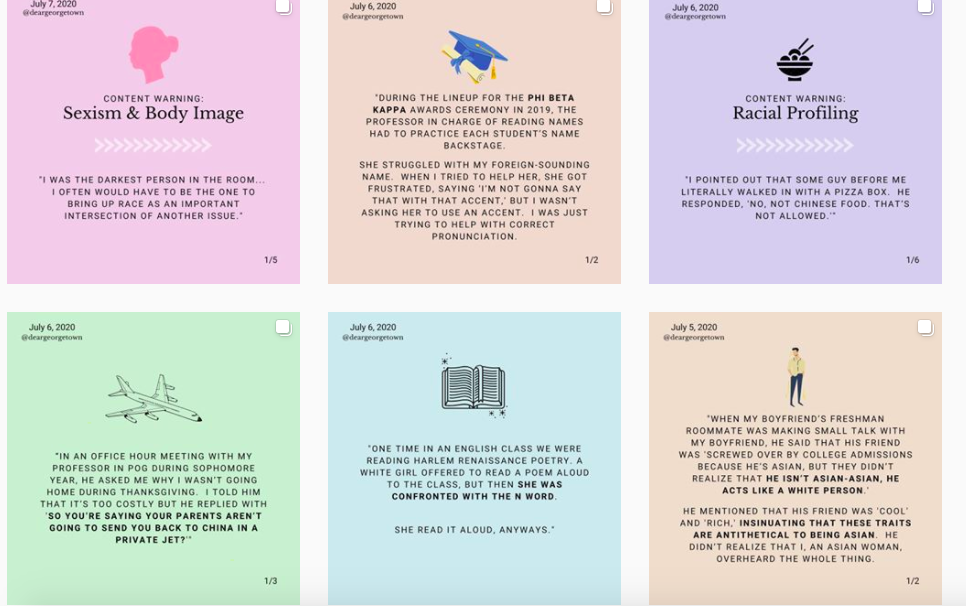CW: Racism
When Tara Ravishankar (COL ‘22) came across various Instagram accounts telling the stories of marginalized students at predominantly white institutions (PWIs) across the country, she immediately thought of her experience during a philosophy class this past fall—and wanted to share it.
As a part of a country-wide reckoning about the prevalence of racism following the Black Lives Matter protests beginning in June, students at universities including Georgetown have begun sharing, through social media, their experiences with racism both inside the classroom and within the campus community at large.
According to Ravishankar, there was a clear contrast between the well-sourced information her professor provided on Christianity and the outdated, often-inaccurate information he gave on religions such as Hinduism and Islam.
“The video on Hinduism he assigned was from the ’80s and said that Hinduism had magic spells. The fact sheet had things misspelled and misrepresented,” Ravishankar, a Hindu student, said. “When I tried to correct some of the things in a presentation, he proceeded to refute me on every point in front of the entire class.”
This incident, which Ravishankar submitted to the Instagram page “Dear PWI,” was only one of many uncomfortable interactions she and other students of color had during that class. The professor in question consistently made offensive remarks, according to Ravishankar, including calling Indigenous peoples “primitive,” singling out an Asian student to make her speak Chinese, and asking a Muslim student to justify “radical Islamic terrorism.”
All members of the Georgetown community, including students like Ravishankar, have the opportunity to report incidents of racism to the university for review through Georgetown’s Bias Reporting System, which defines a bias-related incident as “language or behaviors which demonstrate bias against persons because of… color, disability, ethnicity, gender, gender identity and expression, national origin, race, religion, and/ or sexual orientation.”
Once a report is filed, a team including members of the Office of Institutional Diversity, Equity, and Affirmative Action, GUPD, and Campus Ministry, etc. helps the filer determine whether or not to pursue an investigation with GUPD or file a complaint with the Office of Student Conduct.
According to university statistics, during the 2016-2017 school year—the last year where exact numerical statistics are available—72 bias reports were filed with the university. A vast majority of the reports over the past two school years have been filed by either graduate students or Georgetown professors and staff. It is unclear how many of these reports turned into official investigations or complaints.
For many students, including Ravishankar, the reporting system is defined by its lack of transparency and seeming failure to bring accountability. Although she believes her experience is a clear example of bias, she opted not to file a report out of fear the professor in question would not be held accountable and that it would negatively impact her grade in the class.
For the owners of the Dear Georgetown Instagram page, the frustration around official channels to address issues of racism was one of the factors that inspired them to start the Instagram page. Modeled after the “Dear PWI” account, students of color at Georgetown are able to submit their experiences with racism on campus via Google Forms.
“As someone who has utilized many of the resources the university has for reporting racist experiences, I’ve yet to see the university address any of them,” the owners of the Dear Georgetown page, who requested to remain anonymous, wrote in an email to the Voice. “We wanted to provide a space for BIPOC (Black, Indigenous, and People of Color) students to share their experiences of microaggressions, discrimination, and prejudice on campus.”
The Instagram page currently has over 1,600 followers and has received over 50 submissions. The page owners, both of whom are students of color, take time after each submission to educate themselves and make sure they are accurately presenting the information before sharing it anonymously.
The submissions they received have only solidified their perception of the ineffectiveness of the bias reporting system. “The number of submissions we received about the failed bias reporting system is absolutely ridiculous. Over and over, we see that people in positions of relative power, like your freshman floor RA or your professor, ignore the racism that BIPOC are subjected to,” they wrote.
Beyond highlighting institutional failures, the page also features students’ experiences of racism from their peers on campus. For the page owners, it is vital for Georgetown students to understand the impact their comments and jokes might have on students of color.
“In my experience, sometimes people aren’t attuned to the racist implications of the comments they make, or they have no idea how simple behaviors like talking over someone contribute to the silencing of BIPOC voices. The submissions have been really clear about naming what they experienced and why it’s wrong or harmful, and it’s so important to connect the dots,” they wrote.
Yet, Ravishankar is cautious about the impact social media platforms will have on bringing about concrete change, especially when it comes to holding professors accountable inside the classroom. “It’s important to have a platform to raise awareness,” she said. “But is Georgetown going to care? [That professor] has been here for over 50 years. What is Georgetown going to do about his behavior?”






[…] Source link […]